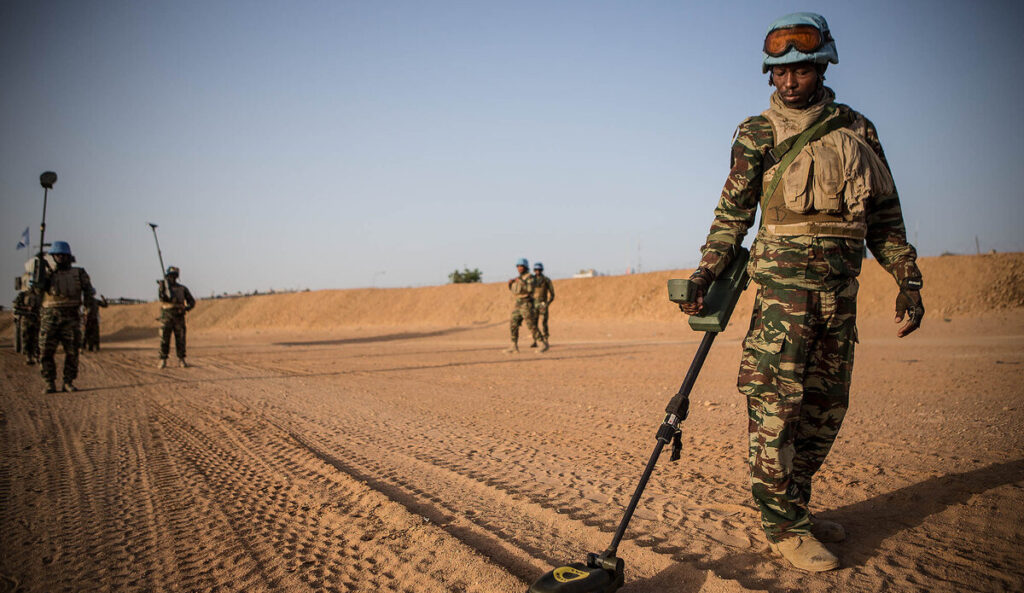ADF STAFF
Several Malian Soldiers died when they were ambushed by terrorists linked to the Islamic State group (IS) in the northeast Ménaka region, near the Nigerien border, in early August. The Soldiers were in a convoy headed for Niger nine days after that country’s military coup.
An elected official said Russian Wagner Group mercenaries also are deployed in the area.
“According to an initial assessment, we lost six men,” a military official told Agence France-Presse (AFP). “We have today launched the search for others (missing), but the terrorists have lost at least 15 fighters.”
Mali is a longtime battleground for terrorist groups such as Jama’at Nusrat al-Islam wal-Muslimin (JNIM), which is linked to al-Qaida, and the Islamic State Greater Sahel (ISGS). The two groups have attacked civilians, security forces and each another for years.
Mali’s ruling junta used the terror threat as justification for coups in 2020 and 2021, but the violence since has spiraled out of control. On April 22, Mali experienced a series of terrorist attacks across the country. The first was in Sévaré in central Mali’s Mopti region.
Amadou Djiguiba said he had just finished praying when he was shocked by a series of loud noises. He did not realize it was the sound of car bombs detonating near a Malian military camp. The attack resulted in the deaths of 10 civilians, three Soldiers and 88 terrorists, according to Mali’s ruling junta.
“At first, we thought the tragedy happened at home,” Djiguiba told AFP. “Some people thought that a building collapsed but came to ask us for help at the station. We went to the camp to inform the commander. We also alerted the civil protection. Around 6 a.m., the authorities came and together we extracted the injured and dead. It was really hard.”
As of July, Mali was on pace to have more than 1,000 violent events involving militant Islamist groups in 2023, eclipsing last year’s record levels of violence and a nearly three-fold increase from when the junta first seized power, according to the Africa Center for Strategic Studies (ACSS).
From mid-2022 to mid-2023, violent events linked to “militant Islamist groups” rose to 1,024, up from 862 such events over the previous time frame, according to the ACSS report. The violent events include attacks on security forces and civilians.
In the first half of 2023, there were 16 episodes of “militant Islamist violence” within 150 kilometers of Bamako, the nation’s capital, compared to five such events in the previous six months. Since 2021, violence against civilians has surged 278% with more than 1,600 recorded fatalities, the report showed.
The United Nations Security Council unanimously voted in June to end its 10-year peacekeeping mission, commonly known as MINUSMA, after Mali’s military junta, led by Col. Assimi Goïta, asked the 13,000-strong force to leave “without delay.” In August 2022, the last French troops left the country over tensions with Goïta.
As MINUSMA and French troops departed, the Wagner Group entered at a cost of nearly $11 million per month to provide security and training — while also exploiting gold mining.
But instead of stemming the bloodshed, the group seems to be causing it. Overall, 71% of Wagner’s engagement in political violence in Mali has taken the form of attacks targeting civilians, according to the Armed Conflict Location & Event Data Project.
The group has targeted civilians during attacks in the Mopti, Koulikoro, Segou and Timbuktu regions. Hundreds of civilians died in those attacks, which included the massacre of more than 500 people in Moura in the Mopti region in March 2022. The attack was perpetrated by Malian troops and the Wagner Group.
Witnesses told Reuters that the troops and mercenaries arrived in helicopters, then fanned across the town and fired at civilians.
A man named Amadou said he was captured and taken to a riverbank, where thousands of men sat with their hands tied. Over four days, they were held with little food or water and no protection from the blazing sun. Men were taken in small groups to the edge of a mass grave and shot.
“It was unimaginable,” Amadou told Reuters. “They came, they took 15, 20 people and lined them up. They made them kneel down and shot them.”

